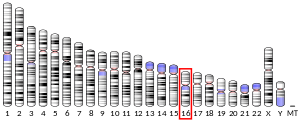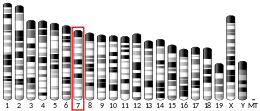NOMO1
| NOMO1 | |||||||||||||||||||||||||
|---|---|---|---|---|---|---|---|---|---|---|---|---|---|---|---|---|---|---|---|---|---|---|---|---|---|
| Identifiers | |||||||||||||||||||||||||
| Aliases | NOMO1, Nomo, PM5, NODAL modulator 1 | ||||||||||||||||||||||||
| External IDs | MGI: 2385850 HomoloGene: 13810 GeneCards: NOMO1 | ||||||||||||||||||||||||
| |||||||||||||||||||||||||
| |||||||||||||||||||||||||
| |||||||||||||||||||||||||
| Orthologs | |||||||||||||||||||||||||
| Species | Human | Mouse | |||||||||||||||||||||||
| Entrez | |||||||||||||||||||||||||
| Ensembl | |||||||||||||||||||||||||
| UniProt | |||||||||||||||||||||||||
| RefSeq (mRNA) | |||||||||||||||||||||||||
| RefSeq (protein) | |||||||||||||||||||||||||
| Location (UCSC) | Chr 16: 14.83 – 14.9 Mb | Chr 7: 46.03 – 46.08 Mb | |||||||||||||||||||||||
| PubMed search | [3] | [4] | |||||||||||||||||||||||
| Wikidata | |||||||||||||||||||||||||
| |||||||||||||||||||||||||
Nodal modulator 1 is a protein that in humans is encoded by the NOMO1 gene.[5][6][7]
This gene encodes a protein originally thought to be related to the collagenase gene family. This gene is one of three highly similar genes in a region of duplication located on the p arm of chromosome 16. These three genes encode closely related proteins that may have the same function. The protein encoded by one of these genes has been identified as part of a protein complex that participates in the Nodal signaling pathway during vertebrate development. Mutations in ABCC6, which is located nearby, rather than mutations in this gene are associated with pseudoxanthoma elasticum (PXE).[7]
References
- 1 2 3 ENSG00000274779 GRCh38: Ensembl release 89: ENSG00000103512, ENSG00000274779 - Ensembl, May 2017
- 1 2 3 GRCm38: Ensembl release 89: ENSMUSG00000030835 - Ensembl, May 2017
- ↑ "Human PubMed Reference:".
- ↑ "Mouse PubMed Reference:".
- ↑ Templeton NS, Rodgers LA, Levy AT, Ting KL, Krutzsch HC, Liotta LA, Stetler-Stevenson WG (Mar 1992). "Cloning and characterization of a novel human cDNA that has DNA similarity to the conserved region of the collagenase gene family". Genomics. 12 (1): 175–6. doi:10.1016/0888-7543(92)90425-R. PMID 1310294.
- ↑ Haffner C, Frauli M, Topp S, Irmler M, Hofmann K, Regula JT, Bally-Cuif L, Haass C (Aug 2004). "Nicalin and its binding partner Nomo are novel Nodal signaling antagonists". EMBO J. 23 (15): 3041–50. doi:10.1038/sj.emboj.7600307. PMC 514924. PMID 15257293.
- 1 2 "Entrez Gene: NOMO1 NODAL modulator 1".
Further reading
- Lim J, Hao T, Shaw C, et al. (2006). "A protein-protein interaction network for human inherited ataxias and disorders of Purkinje cell degeneration". Cell. 125 (4): 801–14. doi:10.1016/j.cell.2006.03.032. PMID 16713569.
- Pope SN, Lee IR (2005). "Yeast two-hybrid identification of prostatic proteins interacting with human sex hormone-binding globulin". J. Steroid Biochem. Mol. Biol. 94 (1–3): 203–8. doi:10.1016/j.jsbmb.2005.01.007. PMID 15862967.
- Martin J, Han C, Gordon LA, et al. (2005). "The sequence and analysis of duplication-rich human chromosome 16". Nature. 432 (7020): 988–94. doi:10.1038/nature03187. PMID 15616553.
- Colland F, Jacq X, Trouplin V, et al. (2004). "Functional Proteomics Mapping of a Human Signaling Pathway". Genome Res. 14 (7): 1324–32. doi:10.1101/gr.2334104. PMC 442148. PMID 15231748.
- Lehner B, Sanderson CM (2004). "A Protein Interaction Framework for Human mRNA Degradation". Genome Res. 14 (7): 1315–23. doi:10.1101/gr.2122004. PMC 442147. PMID 15231747.
- Strausberg RL, Feingold EA, Grouse LH, et al. (2003). "Generation and initial analysis of more than 15,000 full-length human and mouse cDNA sequences". Proc. Natl. Acad. Sci. U.S.A. 99 (26): 16899–903. doi:10.1073/pnas.242603899. PMC 139241. PMID 12477932.
- Loftus BJ, Kim UJ, Sneddon VP, et al. (1999). "Genome duplications and other features in 12 Mb of DNA sequence from human chromosome 16p and 16q". Genomics. 60 (3): 295–308. doi:10.1006/geno.1999.5927. PMID 10493829.
- van Soest S, Swart J, Tijmes N, et al. (1997). "A Locus for Autosomal Recessive Pseudoxanthoma Elasticum, with Penetrance of Vascular Symptoms in Carriers, Maps to Chromosome 16p13.1". Genome Res. 7 (8): 830–4. doi:10.1101/gr.7.8.830. PMC 310666. PMID 9267806.
- Matoba R, Okubo K, Hori N, et al. (1994). "The addition of 5'-coding information to a 3'-directed cDNA library improves analysis of gene expression". Gene. 146 (2): 199–207. doi:10.1016/0378-1119(94)90293-3. PMID 8076819.
This article is issued from
Wikipedia.
The text is licensed under Creative Commons - Attribution - Sharealike.
Additional terms may apply for the media files.



